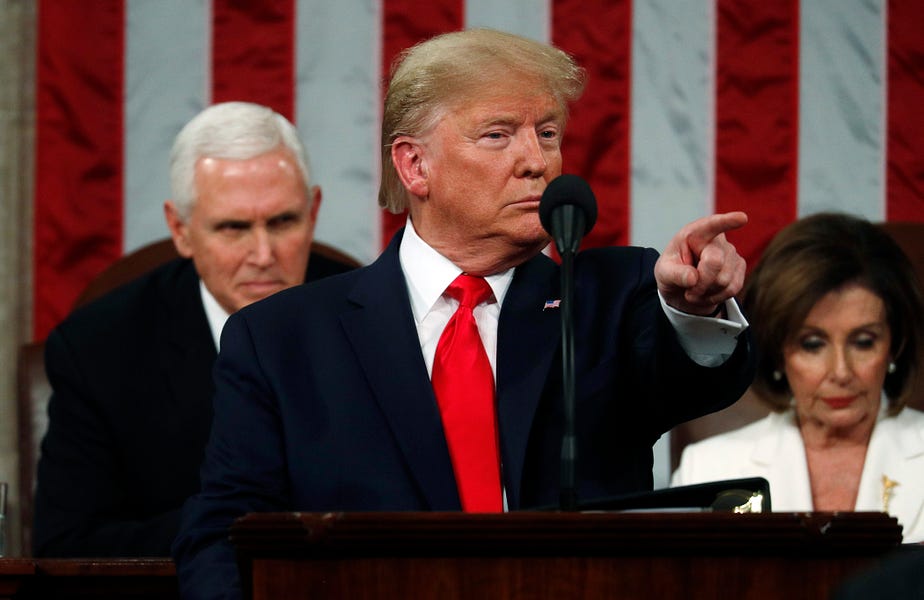In an Instragam video over the weekend, Rep. Alexandria Ocasio-Cortez, a New York Democrat, mistakenly referred to economist John Maynard Keynes as “Milton Keynes,” mashing up his name with that of Milton Friedman—“a (very) different economist,” she later clarified, helpfully. But “Milton Keynes” is pretty good short-hand for how most Republican politicians have long acted. When times are good or they’re raising money from deep-pocketed donors, they preach the free-market gospel of Friedman, perhaps its greatest evangelist.
Everyone, however, is a Keynesian in a crisis: Even conservative politicians who otherwise talk up the wonder-working power of small government find cause to support deficit spending to boost the economy. The truth of Friedman’s famous declaration that “we are all Keynesians now” was on display during the Great Recession. Both Democrats and Republicans eventually proposed fiscal stimulus plans meant to quickly boost demand in the collapsing U.S. economy. (Republicans subsequently blasted the Obama stimulus as a “failed neo-Keynesian experiment.”) It was all Keynesian economics 101: When a lack of overall demand causes falling output and rising unemployment, governments should spur growth by increasing demand through tax cuts and spending increases. Budgets can return to normal, preferably accumulating fiscal surpluses, once prosperity returns.
But the arrival of Donald Trump into Republican politics seems to have caused a bizarre new mutation in the GOP’s Milton Keynes hybrid. This strange creature was on display in an interview Vice President Mike Pence did with CNBC on Friday. Pence—formerly a Tea Partier who believed in “cut to grow” austerity—offered an odd explanation for the Trump administration’s role in the rising federal budget deficit, up nearly 50 percent over the past two years. “The president came into office and he said, ‘First and foremost, we have to restore growth,’” Pence said. “That’s how we will deal with the long-term fiscal challenges facing our country. And deficits and debt are right in line. But it is first about getting this economy moving again and we really do believe the trajectory of this economy.”
One way to interpret Pence’s statement is that President Trump thought he faced a crucial decision early in his first term: prioritize economic growth versus emphasizing fiscal rectitude. And President Trump, not surprisingly, chose growth via big tax cuts that were meant to, in the president’s own words, “prime the pump.” Now that metaphor was never actually used by economist Keynes—nor invented by Trump despite his claim of authorship—but the idea it embodies is closely associated with his notion that activist government policy should attempt to kickstart a moribund economy.
But the U.S. economy wasn’t in a recession, much less in a crisis, when Trump took office. The economy was “already moving.” The unemployment rate had already fallen to 4.7 percent in January 2017 from 10 percent in October 2009. Economic growth was steady if unspectacular, averaging 2.2 percent annually over the previous seven years. And while Pence is correct in noting the recovery was historically lackluster, growth is no better today. GDP, adjusted for inflation, has averaged 2.5 percent during the Trump presidency and just 2.1 percent over the past three quarters. Growth is a tick slower right now than when Trump took the oath of office. The main effect of the stimulus was to offset Trump’s growth-dampening trade war and give business investment a brief boost in the first half of 2018. Oh, and also to crank up the debt. If we aren’t in a crisis needing deficit-financed Keynesian stimulus now—Trump calls the economy “the greatest in the history of the country”—then we weren’t in one back then, either. There was no economic reason for Trump to avoid paying for his tax cuts and helping prevent a big surge in red ink.
Then again, maybe Pence was referring to a political rather than economic trade-off. After all, even a president whose party controls Congress has only so much political capital to spend. If that was the reasoning, it was a bad trade-off. The Trump tax cuts would be more politically sustainable over the long term had the Republicans made a real effort to pay for them, such as by skipping the high-end income tax cuts and slashing tax breaks that mostly help wealthier Americans. Not only would lower deficits undermine the future fiscal argument against them, but the tax cuts would look less tilted to the wealthy.
And while the inner Pence might care about deficits, it’s obvious Trump almost certainly doesn’t. Nor does he probably worry about the long-term damage they risk to the American economy. One has to ignore a great many things to believe otherwise. Trump didn’t mention the national debt in his State of the Union address last week. Ignore that. Also nothing in that speech about reforming Medicare and Social Security. Ignore that, too. And while you’re at it, give no credence to media reports that Trump has directly told his White House team that he sees the growing fiscal gap as some other president’s problem. Ignore all of it.
No Republican would call himself a Keynesian. But Keynesian economics, properly understood, might lead to a better longer-term outcome than a sort of anti-economics driven by impulse and the desire for short-term political advantage. Where have you gone, Milton Keynes?
James Pethokoukis is an analyst at the American Enterprise Institute and a CNBC contributor.
Photograph of Donald Trump at the State of the Union by by Leah Millis-Pool/Getty Images.






Please note that we at The Dispatch hold ourselves, our work, and our commenters to a higher standard than other places on the internet. We welcome comments that foster genuine debate or discussion—including comments critical of us or our work—but responses that include ad hominem attacks on fellow Dispatch members or are intended to stoke fear and anger may be moderated.
With your membership, you only have the ability to comment on The Morning Dispatch articles. Consider upgrading to join the conversation everywhere.